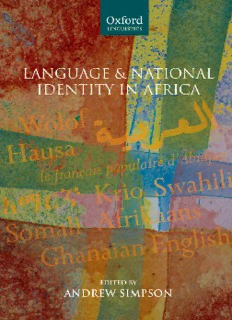
Language and National Identity in Africa PDF
Preview Language and National Identity in Africa
Language and National Identity in Africa alsoeditedbyAndrewSimpsonandpublishedbyOxfordUniversityPress LanguageandNationalIdentityinAsia Language and National Identity in Africa editedby ANDREW SIMPSON 1 3 GreatClarendonStreet,OxfordOX26DP OxfordUniversityPressisadepartmentoftheUniversityofOxford. ItfurtherstheUniversity’sobjectiveofexcellenceinresearch,scholarship, andeducationbypublishingworldwidein Oxford NewYork Auckland CapeTown DaresSalaam HongKong Karachi KualaLumpur Madrid Melbourne MexicoCity Nairobi NewDelhi Shanghai Taipei Toronto Withofficesin Argentina Austria Brazil Chile CzechRepublic France Greece Guatemala Hungary Italy Japan Poland Portugal Singapore SouthKorea Switzerland Thailand Turkey Ukraine Vietnam OxfordisaregisteredtrademarkofOxfordUniversityPress intheUKandincertainothercountries PublishedintheUnitedStates byOxfordUniversityPressInc.,NewYork ©2008editorialmatterandorganizationAndrewSimpson ©2008thechapterstheirvariousauthors Themoralrightsoftheauthorshavebeenasserted DatabaserightOxfordUniversityPress(maker) FirstpublishedbyOxfordUniversityPress2008 Allrightsreserved.Nopartofthispublicationmaybereproduced, storedinaretrievalsystem,ortransmitted,inanyformorbyanymeans, withoutthepriorpermissioninwritingofOxfordUniversityPress, orasexpresslypermittedbylaw,orundertermsagreedwiththeappropriate reprographicsrightsorganization.Enquiriesconcerningreproduction outsidethescopeoftheaboveshouldbesenttotheRightsDepartment, OxfordUniversityPress,attheaddressabove Youmustnotcirculatethisbookinanyotherbindingorcover andyoumustimposethesameconditiononanyacquirer BritishLibraryCataloguinginPublicationData Dataavailable LibraryofCongressCataloginginPublicationData Dataavailable TypesetbySPIPublisherServices,Pondicherry,India PrintedinGreatBritain onacid-freepaperby BiddlesLtd.,King’sLynn,Norfolk ISBN 978–0–19–928674–4HB ISBN 978–0–19–928675–1PB 1 3 5 7 9 10 8 6 4 2 Contents ListofMaps vii NotesonContributors viii 1 Introduction 1 AndrewSimpson 2 Egypt:FromEgyptiantoPan-ArabNationalism 26 YasirSuleiman 3 Morocco:Language,Nationalism,andGender 44 MohaEnnajiandFatimaSadiqi 4 Sudan:Majorities,Minorities,andLanguageInteractions 61 WendyJames 5 Senegal:TheEmergenceofaNationalLinguaFranca 79 FionaMcLaughlin 6 Mali:InDefenceofCulturalandLinguisticPluralism 98 IngseSkattum 7 SierraLeone:KrioandtheQuestforNationalIntegration 122 B.AkíntúndéOyètádéandVictorFasholeLuke 8 Ghana:IndigenousLanguages,English,andanEmerging NationalIdentity 141 AkosuaAnyidohoandM.E.KroppDakubu 9 IvoryCoast:TheSupremacyofFrench 158 AnneMosengKnutsen 10 Nigeria:Ethno-linguisticCompetitionintheGiantofAfrica 172 AndrewSimpsonandB.AkíntúndéOyètádé 11 Cameroon:OfficialBilingualisminaMultilingualState 199 EdmondBiloaandGeorgeEchu 12 D.R.Congo:Languageand‘AuthenticNationalism’ 214 EyambaG.Bokamba 13 Kenya:LanguageandtheSearchforaCoherentNationalIdentity 235 ChegeGithiora 14 Tanzania:TheDevelopmentofSwahiliasaNationaland OfficialLanguage 252 FaroukTopan vi Contents 15 TheHornofAfrica:Ethiopia,Eritrea,Djibouti,andSomalia 267 DavidAppleyardandMartinOrwin 16 Zambia:‘OneZambia,OneNation,ManyLanguages’ 291 LutzMartenandNancyC.Kula 17 SouthAfrica:TheRockyRoadtoNationBuilding 314 RajendMesthrie References 339 Index 363 List of Maps Africa xiv Egypt 27 Morocco 46 Sudan 63 Senegal 82 Mali 99 SierraLeone 124 Ghana 142 IvoryCoast 160 Nigeria 174 Cameroon 201 D.R.Congo 215 Kenya 238 Tanzania 253 Ethiopia 270 Eritrea 281 SomaliaandDjibouti 284 Zambia 292 SouthAfrica 316 Notes on Contributors AKOSUAANYIDOHOhasaPhDinForeignLanguageEducationfromtheUniversityofTexasat Austin,andhastaughtformanyyearsintheDepartmentofLinguistics,UniversityofGhana, Legon,whereshewastheHeadfrom2000to2002.Sheisstillassociatedwiththatinstitution afterherretirement,supervisinggraduatestudents’dissertations.Herresearchinterestsinclude second language teaching and learning, language in education, and women’s oral culture in Africa.Shehaspublishedmanyarticlesinthesefields.ShecurrentlyworksastheDirectorof NewYorkUniversity’sstudyabroadprogrammeinGhana. DAVID APPLEYARD is Professor Emeritus of the Languages of the Horn of Africa at SOAS (SchoolofOrientalandAfricanStudies)intheUniversityofLondon,wherehetaughtAmharic andanumberofotherHornofAfricalanguages,aswellasvariousaspectsofEthiopianStudies, from1975untilhisretirementin2006.Hisresearchinterestscoverawiderangeoflanguages and linguistic issues of the region, but focus especially on the typological, comparative, and historicallinguisticsofEthiopianSemiticandCushiticlanguages.Hehaswrittenextensively in these fields, and his major publications include EthiopianManuscripts (1993), the textbook Colloquial Amharic (1995), and A Comparative Dictionary of the Agaw Languages (2006). He is currently a member of the international advisory and editorial board of the Encyclopaedia Aethiopica. EDMONDBILOAisProfessorandChairoftheDepartmentofAfricanLanguagesandLinguistics intheUniversityofYaoundéIinCameroon.HisteachinginterestsincludeFrenchlinguistics, generativesyntax,andpsycholinguistics.HeistheauthorofFunctionalCategoriesandtheSyntax ofFocusinTuki(Munich:LincomEuropa1995);Syntaxegénérative.Lathéoriedesprincipesetdes paramètres(Munich:LincomEuropa1998);LalanguefrançaiseauCameroun(Bern:PeterLang 2003);Coursdelinguistiquecontemporaine(Munich:LincomEuropa2004),Grammairegénérative. LathéorieminimalistedeNoamChomsky(Yaoundé:CameroonUniversityPress2004);Lefrançais encontactavecl’anglaisauCameroun(Munich:LincomEuropa2006).Hehaspublishedarticles onthelinguisticsandsociolinguisticsoftheFrenchlanguageinCameroon,onthesyntaxof Africanlanguages,andontheacquisitionofFrench. EYAMBAG.BOKAMBAisProfessorofLinguisticsandAfricanLanguagesintheDepartmentof LinguisticsattheUniversityofIllinoisatUrbana-Champaignwherehehasservedsince1974ina varietyofadministrativepositions.InitiallytrainedasaBantusyntacticianatIndianaUniversity where he earned his PhD in 1976, he developed a secondary interest in sociolinguistics and has pursued research into multilingualism, in particular including language policies vis-à-vis education in Africa, language variation, and code-switching. He has published extensively in these areas, on Bantu syntax, and on African language pedagogical materials, with his latest publication (co-authored with his spouse) being TósololanaLingála:AMultidimensional ApproachtotheTeachingandLearningofLingálaasaForeignLanguage(NALRCPress,University ofWisconsin-Madison,2004).Heiscurrentlyworkingontheproductionofasociolinguistic NotesonContributors ix bookentitledMultilingualisminSub-SaharanAfrica,whichwillrepresenttheculminationofhis researchinthisarea. MARY ESTHER KROPP DAKUBU is a Professor in the Institute of African Studies of the Uni- versity of Ghana, where she has been on the staff since 1964. Her research is centred on the Niger-Congo languages, especially Kwa and Gur. She is the author of Dagaare Grammar (Legon:InstituteofAfricanStudies2005);GaPhonology(Legon:IAS2002);Ga–EnglishDictionary withEnglish–GaIndex(Accra:BlackMaskPublishers2002);KorleMeetstheSea,aSociolinguistic HistoryofAccra(NewYorkandOxford:OUP1997);TheDangmeLanguage:AnIntroductoryStudy (London /Accra: Macmillan /Unimax 1987); and OneVoice:TheLinguisticCultureofanAccra Lineage(Leiden:AfricanStudiesCentre1981).SheeditedandwasamajorcontributortoThe LanguagesofGhana(London:KeganPaulInternationalLtd.1988). GEORGEECHUisAssociateProfessorofFrenchandLinguisticsandHeadoftheDepartment ofBilingualStudiesintheUniversityofYaoundéIinCameroon.Histeachinginterestsinclude Frenchlinguistics,sociolinguistics,contrastivelinguistics,andtranslation.HewasSeniorFul- brightScholaratIndianaUniversityBloomingtonfromAugust2002toMay2003.Intheareaof research,hehaspublishedseveralarticlesandco-editedthefollowingbooks:OfficialBilingualism andLinguisticCommunicationinCameroon(NewYork:PeterLang1999);andAfricaMeetsEurope: LanguageContactinWestAfrica(NewYork:NovaSciencePublishers2004). MOHA ENNAJI holds a PhD from the University of Essex in Linguistics (1982). He is Full ProfessorattheFacultyofLetters,UniversityofFez,wherehewasChairoftheEnglishDepart- ment from 1988 to 1994. He is currently the Director of the international journal Languages and Linguistics, published in Morocco under his supervision since 1998. Professor Ennaji is the author and/or editor of numerous books and articles on language, culture, and society. Hismostrecentbooksare:Multilingualism,CulturalIdentity,andEducationinMorocco(Springer 2005);AGrammarofAmazigh(2004)co-authoredwithFatimaSadiqi;andAGrammarofMoroccan Arabic(2004)(co-authoredwithA.Makhoukh,H.Saidi,M.Moubtassime,andS.Slaoui).His mostrecentarticlesare:‘TheArabWorld(MaghrebandNearEast)’,inHandbookofLanguage andEthnicIdentity,editedbyProfessorJoshuaFishman(OUP1999),and‘LanguageContact, Arabization Policy and Education in Morocco’, in Language Contact and Language Conflict in Arabic,editedbyAleyaRoushdy(Curzon2002). CHEGE GITHIORA is primarily engaged in descriptive studies of east African languages and linguistics.HehaspublishedonG˜ıku˜yu˜ morphosyntaxandorthography,Swahililexicography, andoncultureandidentityoftheAfricanDiasporainLatinAmerica.HeisauthorofDiccionario Swahili–Español(ElColegiodeMexico2002)andco-editor(withManfrediandLittlefield)of Trends in African Linguistics Vol VI (Africa World Press 2004). His other interests are in the dynamicsoflanguageinsociety,andhismostrecentresearchandpublicationisonmultilingual- ismandsocialstratificationoflanguageinNairobicity.AgraduateofMichiganStateUniversity, hetaughtSwahiliatElColegiodeMexico,andatBostonUniversity(1998–2000).Heiscur- rentlylecturerinSwahiliattheUniversityofLondon’sSchoolofOrientalandAfricanStudies (SOAS). WENDYJAMESisProfessorofSocialAnthropologyintheUniversityofOxford,andaFellowof theBritishAcademy. ShehastaughtintheUniversityofKhartoumandcarriedoutresearchin
Description: